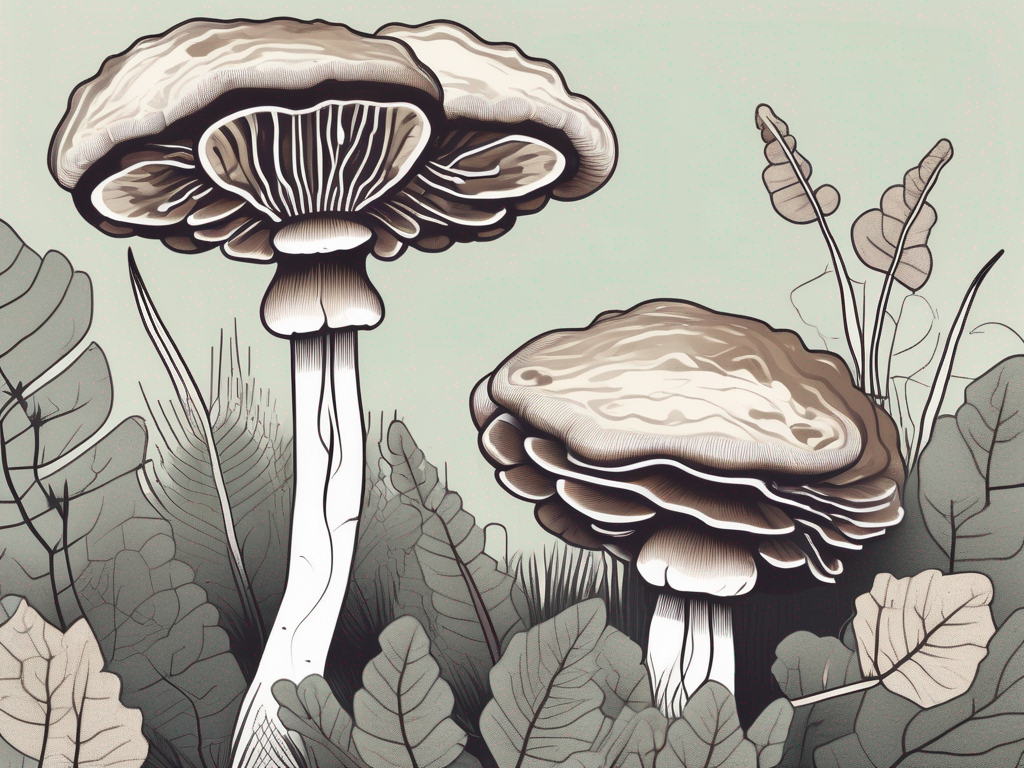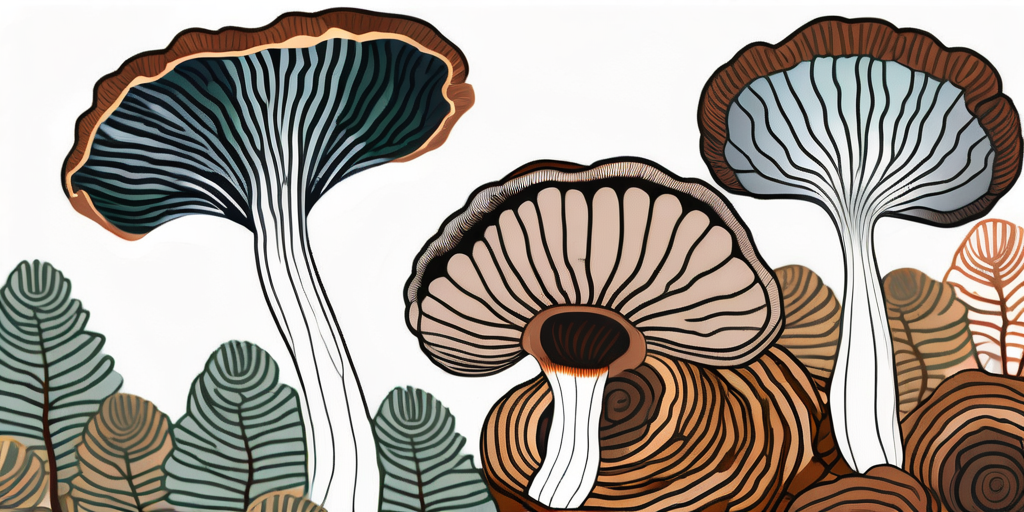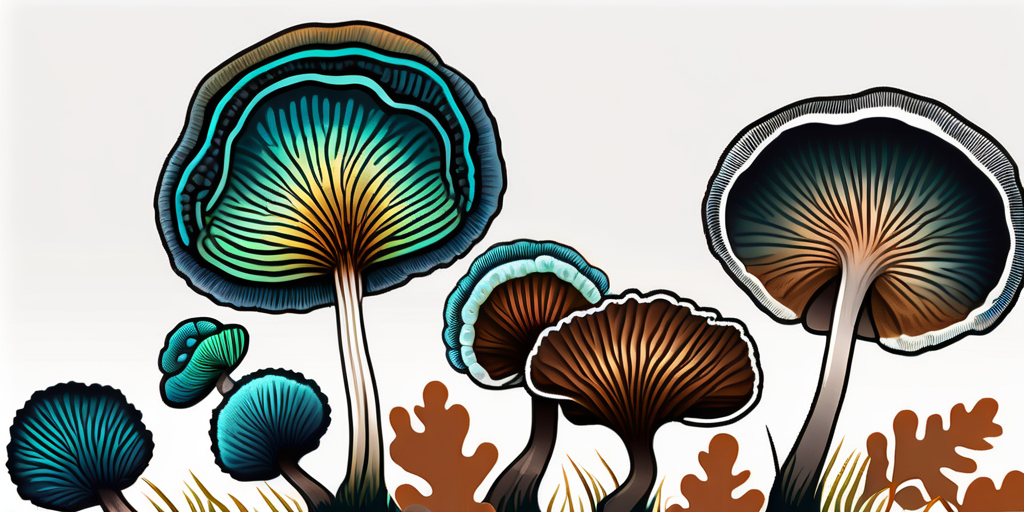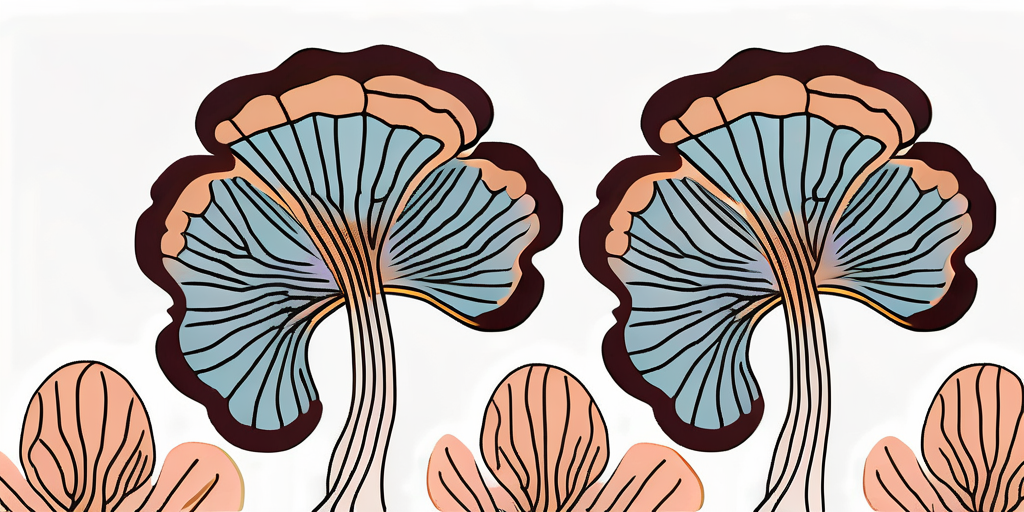Turkey Tail Mushrooms: A Potent Ally in Cancer Therapy?

Discover the powerful potential of turkey tail mushrooms in cancer therapy.
Turkey Tail Mushrooms: A Potent Ally in Cancer Therapy
Turkey Tail mushrooms, scientifically known as Trametes versicolor, have gained significant attention in recent years for their potential role in cancer therapy. With its rich history, nutritional profile, and scientifically-backed health benefits, Turkey Tail mushrooms have emerged as a potent ally in the fight against cancer. In this article, we will delve into the various aspects of Turkey Tail mushrooms and explore how they can be incorporated into a cancer-fighting diet.
Understanding the Turkey Tail Mushroom
The History and Origin of Turkey Tail Mushrooms
The use of Turkey Tail mushrooms in traditional medicine dates back centuries. Known for their vibrant colors that resemble the plumage of a wild turkey, these mushrooms have been prized in ancient Chinese medicine and used as immune-boosting remedies. In Japan, they are known as "Kawaratake," meaning mushroom by the riverbank, and have been utilized for their potent medicinal properties.

Legend has it that the discovery of the Turkey Tail mushroom's medicinal benefits was accidental. In ancient times, a wise herbalist stumbled upon a group of wild turkeys feasting on fallen logs covered in these colorful fungi. Intrigued by the turkeys' robust health and vitality, the herbalist decided to investigate further. Through meticulous experimentation and observation, the herbalist discovered the remarkable immune-boosting properties of the Turkey Tail mushroom, leading to its widespread use in traditional medicine.
Identifying Features of Turkey Tail Mushrooms
Recognizing Turkey Tail mushrooms is relatively easy due to their distinct appearance. They typically grow in clusters on decaying logs or fallen trees and have fan-shaped caps with distinct concentric rings. The colors range from shades of brown, tan, red, orange, and deep green. Underneath the cap, you will find numerous pores that release millions of microscopic spores.
When examining a Turkey Tail mushroom up close, you may notice intricate patterns on its cap, resembling the delicate brushstrokes of an artist. These patterns vary from mushroom to mushroom, creating a mesmerizing display of nature's creativity. The concentric rings on the cap not only add to its aesthetic appeal but also serve as a valuable tool for identifying different species of Turkey Tail mushrooms.
As you explore the forest floor, keep an eye out for Turkey Tail mushrooms, for they are not only a visual delight but also a treasure trove of medicinal potential. Their vibrant colors and unique growth patterns make them a fascinating subject for nature enthusiasts and mycologists alike. So next time you come across these remarkable fungi, take a moment to appreciate their beauty and the centuries-old wisdom that has recognized their healing powers.
The Nutritional Profile of Turkey Tail Mushrooms
Key Nutrients Found in Turkey Tail Mushrooms
Turkey Tail mushrooms are packed with essential nutrients that contribute to their therapeutic effects. These mushrooms are an excellent source of protein and contain all the essential amino acids needed for optimal health. They are also rich in vitamins B, C, and D, as well as minerals such as potassium, calcium, iron, and selenium.

Health Benefits of These Nutrients
The nutritional content of Turkey Tail mushrooms provides numerous health benefits. Vitamin C, for example, supports immune function and aids in collagen production. Vitamin D is essential for bone health and immune system regulation. Selenium is an antioxidant mineral that helps protect cells from damage caused by free radicals.
Let's delve deeper into the health benefits of these key nutrients found in Turkey Tail mushrooms. Vitamin B, present in significant amounts in these mushrooms, plays a crucial role in energy production and maintaining a healthy nervous system. It also aids in the formation of red blood cells, which are responsible for carrying oxygen throughout the body.
In addition to their vitamin content, Turkey Tail mushrooms are a great source of minerals that are vital for various bodily functions. Potassium, for instance, is essential for maintaining proper heart function and regulating blood pressure. Calcium is crucial for strong bones and teeth, while iron is necessary for the production of red blood cells, which prevents anemia.
Furthermore, Turkey Tail mushrooms contain a unique compound called polysaccharide-K (PSK), which has been extensively studied for its potential anti-cancer properties. PSK has shown promising results in enhancing the immune system and inhibiting the growth of cancer cells. This makes Turkey Tail mushrooms a valuable addition to a cancer-fighting diet.
It is worth noting that the nutritional profile of Turkey Tail mushrooms may vary depending on factors such as growing conditions and maturity. However, regardless of these variations, these mushrooms consistently provide a wide range of essential nutrients that can support overall health and well-being.
The Role of Turkey Tail Mushrooms in Cancer Therapy
How Turkey Tail Mushrooms Boost the Immune System
Turkey Tail mushrooms contain a wide array of bioactive compounds, including polysaccharides and triterpenoids, which have been found to stimulate the immune system. These compounds enhance the activity of natural killer cells, T cells, and macrophages, which play crucial roles in identifying and eliminating cancer cells.

But what exactly makes Turkey Tail mushrooms so effective in boosting the immune system? It all comes down to the unique composition of these mushrooms. The polysaccharides found in Turkey Tail mushrooms have been shown to increase the production of cytokines, which are signaling molecules that regulate immune responses. By stimulating the production of cytokines, Turkey Tail mushrooms help to activate and strengthen the immune system, enabling it to better recognize and destroy cancer cells.
In addition to polysaccharides, Turkey Tail mushrooms also contain triterpenoids, which have been found to have potent anti-inflammatory properties. Inflammation is a common feature of cancer, and by reducing inflammation, Turkey Tail mushrooms can help to create an environment that is less favorable for cancer growth and progression. Furthermore, the anti-inflammatory effects of triterpenoids can also alleviate some of the symptoms associated with cancer, such as pain and discomfort.
Turkey Tail Mushrooms and Chemotherapy: A Powerful Combination
Research has shown that Turkey Tail mushroom extracts can enhance the effects of chemotherapy drugs. Combining Turkey Tail mushroom extracts with conventional chemotherapy can lead to enhanced immune function and improved cancer outcomes. Turkey Tail mushrooms may also help to mitigate the side effects of chemotherapy, such as fatigue and immune suppression.
But how exactly do Turkey Tail mushrooms interact with chemotherapy drugs? One possible mechanism is through their ability to modulate the tumor microenvironment. Studies have shown that Turkey Tail mushroom extracts can inhibit the growth of blood vessels that supply nutrients to tumors, effectively starving them and making them more susceptible to the effects of chemotherapy. Additionally, Turkey Tail mushrooms have been found to enhance the delivery of chemotherapy drugs to tumor cells, increasing their effectiveness.
Furthermore, Turkey Tail mushrooms have been shown to have a protective effect on healthy cells during chemotherapy. The bioactive compounds in these mushrooms can help to reduce oxidative stress and DNA damage caused by chemotherapy, minimizing the risk of treatment-related side effects. By supporting the immune system and protecting healthy cells, Turkey Tail mushrooms can make chemotherapy more tolerable and improve overall treatment outcomes.
Scientific Research Supporting the Use of Turkey Tail Mushrooms in Cancer Therapy
Preclinical Studies on Turkey Tail Mushrooms
Preclinical studies have provided compelling evidence of Turkey Tail mushrooms' potential anti-cancer properties. These studies have demonstrated the inhibitory effects of Turkey Tail mushroom extracts on various cancer cell lines and the ability to suppress tumor growth in animal models. The results have sparked interest in further exploring the use of Turkey Tail mushrooms in human cancer trials.
Clinical Trials and Their Findings
Clinical trials investigating the efficacy of Turkey Tail mushrooms in cancer treatment are ongoing, and early findings show promise. In one study, Turkey Tail mushroom extracts were found to improve disease-free survival rates in breast cancer patients. Another trial found that Turkey Tail mushroom supplements, used in combination with standard treatments, improved immune function in colorectal cancer patients.
Furthermore, recent research has focused on understanding the mechanisms behind Turkey Tail mushrooms' anti-cancer effects. Studies have revealed that Turkey Tail mushrooms contain bioactive compounds such as polysaccharopeptides, which have been shown to enhance the immune system's ability to recognize and destroy cancer cells. These compounds also exhibit anti-inflammatory properties, which can help reduce the risk of chronic inflammation, a known contributor to cancer development.
In addition to their direct anti-cancer effects, Turkey Tail mushrooms have been found to have potential benefits in mitigating the side effects of cancer treatments. For example, research has shown that Turkey Tail mushroom extracts can help alleviate chemotherapy-induced nausea and vomiting, improving the quality of life for cancer patients undergoing treatment.
Moreover, studies have explored the potential of Turkey Tail mushrooms as an adjunct therapy in combination with conventional cancer treatments. The synergistic effects of Turkey Tail mushrooms and chemotherapy or radiation therapy have been observed in preclinical models, suggesting that the mushrooms may enhance the effectiveness of these treatments while minimizing their toxic side effects.
As the scientific community continues to unravel the potential of Turkey Tail mushrooms in cancer therapy, it is clear that further research is warranted. Ongoing clinical trials aim to provide more robust evidence of the mushrooms' efficacy and safety, paving the way for their potential integration into standard cancer treatment protocols. With its long history of traditional use and the growing body of scientific evidence, Turkey Tail mushrooms hold promise as a valuable addition to the arsenal of cancer-fighting strategies.
How to Incorporate Turkey Tail Mushrooms into Your Diet
Preparing Turkey Tail Mushrooms for Consumption
While Turkey Tail mushrooms can be consumed raw, they are most commonly used in the form of extracts, teas, tinctures, or powders due to their tough and chewy texture. These mushroom products can be added to soups, stews, sauces, or even brewed into a flavorful tea. It's important to note that wild-harvested mushrooms should always be properly identified to avoid any potential risks.
Turkey Tail Mushroom Supplements: Pros and Cons
Turkey Tail mushroom supplements are readily available in health food stores and online. The advantage of using supplements is the convenience and standardized dosage. However, it's essential to choose reputable brands that undergo testing for quality and purity. Additionally, consulting with a healthcare professional before starting any new supplements is always recommended.
In conclusion, Turkey Tail mushrooms have emerged as a potent ally in cancer therapy due to their immune-boosting properties and potential synergistic effects with conventional treatments. While ongoing research continues to unravel the full therapeutic potential of these mushrooms, incorporating Turkey Tail mushrooms into a balanced and varied diet may prove beneficial for individuals fighting cancer or looking to prevent its occurrence.











